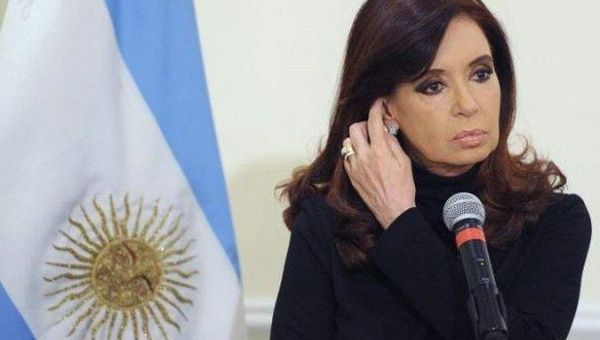
Juez revoca procesamiento de Cristina Fernández en investigación de sobornos
Un juez revocó el procesamiento de la vicepresidenta de Argentina, Cristina Fernández, y de diversos exfuncionarios en una causa en la que se investigan presuntos sobornos realizados durante su mandato como presidenta, entre 2007 y 2015, confirmaron este martes a Efe fuentes de su defensa.
El magistrado Marcelo Martínez De Giorgi dictó la falta de mérito de la exmandataria en un expediente vinculado a la conocida como «causa de los cuadernos», en la que desde 2018 está procesada por haber encabezado presuntamente junto a su marido, el también expresidente Néstor Kirchner (2003-2007) -fallecido en 2010-, una asociación ilícita para cobrar millonarias sumas de dinero por parte de empresarios de la obra pública.
En concreto, en el capítulo de la causa en la que ha sido desvinculada, al igual que algunos de sus antiguos colaboradores, como el exministro de Planificación Federal Julio de Vido, se investigan las supuestas maniobras del Grupo Techint, mayor conglomerado siderúrgico de Argentina, para el pago de sobornos a la cúpula del entonces Gobierno.
UNA CAUSA QUE VIAJA HASTA VENEZUELA
Según la investigación, Luis María Betnaza, director corporativo de Techint, había admitido el pago en 2008 de sumas de dinero a funcionarios argentinos a cambio de gestionar ante el entonces Gobierno del presidente venezolano Hugo Chávez una indemnización por la nacionalización de Siderúrgica del Orinoco, que integraba Techint.
CAMBIOS EN LA SITUACIÓN JUDICIALPese a esta revocación, Fernández aún afronta múltiples procesamientos en otros casos en los que se la acusa de presunta corrupción, que ella atribuye a una persecución de la Justicia, por el mecanismo de ‘lawfare’ (guerra judicial), impulsada por el anterior presidente, Mauricio Macri (2015-2019).
Sin embargo, en los últimos meses diversas decisiones de jueces han aliviado la situación de la exmandataria, que en diciembre pasado volvió al poder, esta vez como vicepresidenta, tras vencer en las urnas junto a Alberto Fernández a Macri.
Judge overturns Prosecution of Cristina Fernandez in bribery investigation
A judge overturned the prosecution of Argentina’s vice president, Cristina Fernández, and several former former actors in a case investigating alleged bribes made during her tenure as president, between 2007 and 2015, on Tuesday confirmed Efe’s sources of her defense.
Judge Marcelo Martínez De Giorgi dictated the lack of merit of the former member in a file linked to the so-called «cause of notebooks», in which since 2018 she has been prosecuted for allegedly leading with her husband, also former President Néstor Kirchner (2003-2007) – who died in 2010 – an illicit association to collect millions of money from public works entrepreneurs.
In particular, the chapter of the cause in which it has been disassociated, like some of its former collaborators, such as the former minister of Federal Planning Julio de Vido, investigates the alleged maneuvers of the Techint Group, the largest steel conglomerate of Argentina, for the payment of bribes to the dome of the then Government.
A CAUSE THAT TRAVELS TO VENEZUELA
According to the research, Luis María Betnaza, corporate director of Techint, had admitted payment in 2008 of sums of money to Argentine officials in exchange for managing before the then government of Venezuelan President Hugo Chávez compensation for the nationalization of Siderúrgica del Orinoco, which integrates Techint.
CHANGES IN THE JUDICIAL SITUATION
Despite this revocation, Fernández still faces multiple prosecutions in other cases in which she is accused of alleged corruption, which she attributes to a prosecution of justice, by the ‘lawfare’ mechanism, promoted by the previous president, Mauricio Macri (2015-2019).
However, in recent months several decisions of judges have alleviated the situation of the former member, who last December returned to power, this time as vice president, after beating Alberto Fernández to Macri at the ballot box.
